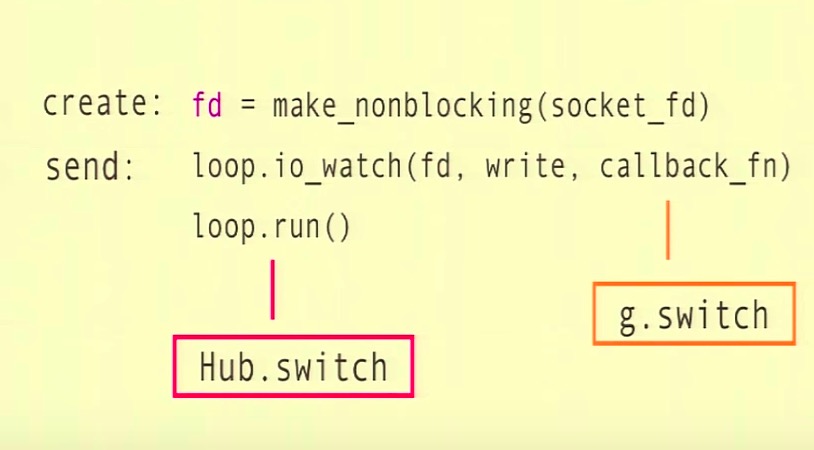jackyfkc.github.io
教土豆学计算机
Gevent
gevent is a coroutine-based Python networking library that uses greenlet to provide a high-level synchronous API on top of the libev event loop.
gevent 是一个基于协程的 Python 网络库; 基于 greenlet 和 libev 提供了一个高层次的同步接口; 王爷以为这是 Python 最出色的库之一.
About Libev
Libev (first released in 2007-11-12) is a high-performance event loop written in C, supporting eight event types
-
I/O -
real time timers -
wall clock timers -
signals -
child status changes -
idle -
check handlers -
prepare handlers
It uses a priority queue to manage timers and uses arrays as fundamental data structure. It has no artificial limitations on the number of watchers waiting for the same event.
It offers an emulation layer for libevent and optionally the same DNS, HTTP and buffer management (by reusing the corresponding libevent code through its emulation layer).
Greenlet
-
user space - the OS does not create or manage them 用户空间 - 操作系统不创建和管理它们
-
cooperatively scheduled - the OS does not schedule or preempt them 协作式调度, 操作系统并不调度和抢占它们
-
lightweight 轻量
Create a Greenlet
New greenlets are spawned by creating a Greenlet instance and calling its start method. (The gevent.spawn() function is a shortcut that does exactly that).
The start method schedules a switch to the greenlet that will happen as soon as the current greenlet gives up control.
Error Handling
If there is an error during execution it won’t escape the greenlet’s boundaries. An unhandled error results in a stacktrace being printed, annotated by the failed function’s signature and arguments:
Customization
To subclass a gevent.Greenlet, override its gevent.Greenlet._run() method and call Greenlet.__init__(self) in __init__
Terminating a Greenlet
Greenlets can be killed synchronously from another greenlet. Killing will resume the sleeping greenlet, but instead of continuing execution, a GreenletExit will be raised.
Greenlets 可以被其他 greenlet kill 掉. kill 操作会唤醒休眠 greenlet 的执行, 准确的说是, 此时会抛出 GreenletExit 异常
Caution: Use care when killing greenlets, especially arbitrary greenlets spawned by a library or otherwise executing code you are not familiar with. If the code being executed is not prepared to deal with exceptions, object state may be corrupted.
小心 当 kill greenlets 时要小心, 尤其是那些你并不熟悉的库创建的 greenlet. 如果执行的代码没有很好的处理异常, 那么对象的状态可能已经混乱了.
Hub
Hub, a special greenlet that runs the event loop.
+-------+
| Main |
+-------+
^
|
+-------+
| Hub |
+-------+
^ ^ ^
+--->-----+ | +-----<-----+
| | |
+----------+ +----------+ +----------+
| Greenlet | | Greenlet | | Greenlet |
+----------+ +----------+ +----------+
Event loop
…
Cooperative multitasking
It is using cooperative scheduling of the greenlets in a single OS process/thread.
Note that the greenlet need to voluntarily switch back to the event loop, any blocking call would block the event loop
在单进程/线程内使用协作式的调度; 注意 greenlet 需要自愿地切回到主事件循环, 另所有阻塞操作都会阻塞整个事件循环
Monkey Patch
from gevent import monkey
monkey.patch_socket()

When monkey patching, it is recommended to do so as early as possible in the lifetime of the process. If possible, monkey patching should be the first lines executed. Monkey patching later, especially if native threads have been created, `atexit` or `signal handlers` have been installed, or sockets have been created, may lead to unpredictable results including unexpected `LoopExit` errors.
建议在整个程序的生命周期中尽可能早地执行 monkey patching. 如果有可能, monkey patch 应该作为程序的第一行代码执行. 越晚执行, 尤其是当创建了原生线程,此时可能 `atexit` 或者信号处理函数已经被注册, 又或者 socket 被创建, 这些都会导致包括 `LoopExit` 在内的不期望的错误出现.
Multi-process
The combination of multiprocessing and gevent brings along certain OS-dependent pitfalls, among others
多进程和 gevent 的组合使用, 可能会带来一些操作系统依赖的错误, 比如
-
After forking on POSIX-compliant systems gevent’s state in the child is ill-posed. One side effect is that greenlets spawned before
multiprocessing.Processcreation run in both, parent and child process. -
a.send()input_msg()above might still block the calling thread non-cooperatively: a ready-to-write event only ensures that one byte can be written. The underlying buffer might be full before the attempted write is complete. -
The
wait_write()/wait_read()-basedapproach as indicated above does not work on Windows (IOError: 3 is not a socket (files are not supported)), because Windows cannot watch pipes for events.
Be sure you understand these consequences before using this functionality, especially late in a program’s lifecycle. For a more robust solution to certain uses of child process, consider gipc.
Caution: Forking a child process that uses gevent, greenlets, and libev can have some unexpected consequences if the child does not immediately exec a new binary.
小心 如果 fork 一个使用了 gevent 的子进程, 且没有立即使用 exec 加载一个新程序, 那么 greenlet 和 libev 可能会导致一些不期望的结果
As an example, do_magic will be called both in parent and child process.
import gevent
from gevent import monkey
monkey.patch_all()
import os, time
def do_magic():
print 'magic...'
def main():
g = gevent.spawn_later(1, do_magic)
pid = os.fork()
if pid != 0: # parent
g.join()
else:
time.sleep(3)
main()
Subprocess support
Utility
To limit concurrency, use the gevent.pool.Pool class
Pros & Cons
pros
- excellent for workloads that are IO/bound, highly concurrent 非常适用于 I/O 密集型工作, 高并发
cons
-
no parallelism 没有并行
-
non-cooperative code will block the entire process 非协作式的代码会阻塞整个程序
-
C Extensions -> use pure Python libraries C 扩展库需替换成纯 Python 库
-
compute-bound greenlets -> use
gevent.sleep(0)计算密集型 greenlets 使用gevent.sleep(0)
-
-
use greenlet blocking detection (greenlet
settrace) 使用 greenlet 提供的阻塞检测方法